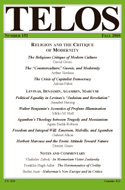From Telos 152 (Fall 2010), Adrian Pabst’s “The Crisis of Capitalist Democracy.” Read the full version at TELOS Online website.
Abstract
 Since the onset of Great Recession that was triggered by the credit crunch in August 2007, both academic and public debate in the West has centered on the failure of free-market capitalism and the return of democratic statehood. This essay argues that such and similar accounts of the current crisis ignore the collusion of state and market and the convergence of democracy and capitalism. The real issue is neither the capture of states by corporations nor that of corporations by states but instead the subordination of society to the centralized state and the unbridled “free market.” Closely connected to this is the triumph of capitalist democracy that reinforces the abstraction from locality, community, and association, which is common to both mass representation and commodification.
Since the onset of Great Recession that was triggered by the credit crunch in August 2007, both academic and public debate in the West has centered on the failure of free-market capitalism and the return of democratic statehood. This essay argues that such and similar accounts of the current crisis ignore the collusion of state and market and the convergence of democracy and capitalism. The real issue is neither the capture of states by corporations nor that of corporations by states but instead the subordination of society to the centralized state and the unbridled “free market.” Closely connected to this is the triumph of capitalist democracy that reinforces the abstraction from locality, community, and association, which is common to both mass representation and commodification.
In particular, the essay explores the formation of post-democratic “market-states” that absorb the autonomous realm of civil society. In this manner, capitalist democracy undermines resistance to the ideological poles of left and right and the institutional poles of state and market. Thus, the only genuine alternative is to strengthen the intermediary institutions of civil society and to foster the social bonds of reciprocity, mutuality, and fraternity.



